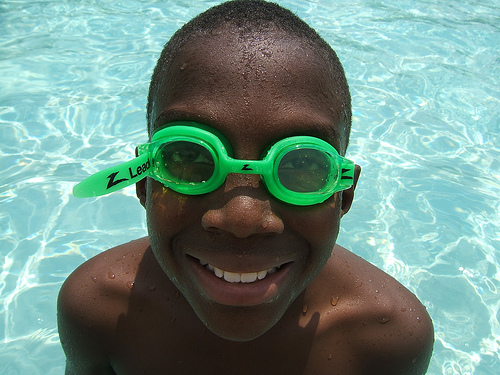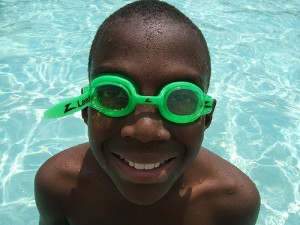Share This
Political Physics: Is Discrimination Okay If You Discriminate Privately?
.
a blogumn by Monique King-Viehland
A controversy is swirling in Huntingdon Valley, Pennsylvania due to the Valley Swim Club (a private swim club) which refused admittance to 65 black and Hispanic kids at the Creative Steps Day Camp, even though the camp had paid the club over $1,950 by in advance to let its campers use the pool.
Their neighborhood pool was closed because of the City of Philadelphia’s budget crisis, so the camp founder Alethea Wright worked out an arrangement with two different organizations for the kids to go swimming during the week. The Jewish Community Center on Tuesdays and Thursdays and the Valley Swim Club on Mondays. Through fundraising efforts and payments from parents, the camp was able to pay for the necessary fees from both organizations for the 65 campers to use the pool.
But according to Philly.Com, “on June 29, [when the] black and Hispanic children from the city camp Creative Steps Inc. made their first visit to the Montgomery County club they heard some members make racial remarks and escort their own children away from the pool. The children were confronted with comments like, “uh, what are all these black kids doing here?”
“They didn’t like the color of my skin. It makes me feel mad. And sad,” said camper Jabriel Brown.
Immediately following the incident, the Valley Swim Club refunded the $1,950 to the Creative Steps Day Camp and terminated the agreement allowing the children to use the club’s pool. According to a statement on the Club’s website, the issue had nothing to do with race. “The day campers were turned away because they overwhelmed the 110,000 gallon pool. We quickly learned that we underestimated the capacity of our facilities, and realized that we could not accommodate the number of children from these camps.”
Okay, so what a minute. Was it an issue with their capacity of the pool or the color of the kids?
I think the answer can be found in the Club President’s own comments when he was interviewed immediately following the incident (and before their carefully worded statement was issued). John Duesler was interviewed on the local NBC affiliate, NBC 10 and he said, “There is a lot of concern that a lot of kids would change the complexion…and the atmosphere of the club.”
But here is the really sad thing, it might not matter.
DISCLAIMER: Now I am about to make a quick legal argument, so it is only fair for me to start by saying that I (a) applied for, was accepted into but did not complete a full semester of law school and so (b) am not a lawyer. Okay, with the disclaimer out there in the open I will not proceed to give my not-so-legal analysis.
From what I have been able to gather, for the most part private clubs can discriminate. According to AllBusiness.Com “private clubs and similar private organizations are exempt from the operation of civil-rights laws so long as such places can prove, if challenged to do so, that the establishment in question is a bona fide private club.” The notion is that people have a right, or a “constitutional principle” to associate with whoever they chose to in their own home or in a private club.
But the issue becomes murky around what the definition of a private club really is.
In March 2007, the Ocean Grove Camp Meeting Association, a Methodist group, denied the request of a lesbian couple to use their boardwalk pavilion for their civil union ceremony. The Ocean Grove Boardwalk Pavilion is a popular site for wedding ceremonies. The church claimed that allowing the couple to use the facility violated the Methodist doctrine as they do not condone same-sex marriages, but the couple claimed their constitutional rights were being violated.
And the New Jersey Division of Civil Rights agreed. They ruled that the “in addition to banning sexual orientation and gender identity discrimination, New Jersey state law specifically forbids discrimination against civil union couples by entities that provide goods and services to the public…the pavilion fell under the category of a “public accommodation,” as it received both state and federal funding on that basis.” The Association filed a lawsuit against the state, claiming that its First Amendment rights of religious freedom guaranteed its right to discriminate against gays and lesbians. “U.S. District Court Judge Joel Pisano threw out the suit Nov. 8, stating that the pavilion was public property, not a religious structure.”
The place at which a private club becomes a “public accommodation” is not a black and white issue. But FindLaw.Com says, “Public accommodation means any accommodation which is open to, accepts or solicits the patronage of the general public.”
Is entering into an agreement with a public camp to allow their kids to swim for a fee a “public accommodation?” The Valley Swim Club sure hopes not. Last Friday, the Pennsylvania Human Relations Commission announced they would open an investigation into the actions of the Valley Swim Club and a law firm acting on behalf of the campers and their families filed a lawsuit in federal court.
A friend of ours is a member of a private pool in the area. She recently invited us to be her guest at their “Friends and Family” Day or something like that. We went and we had a really nice time (my nearly 15 month old had never been in a pool). But I did notice that when my little interracial family of three entered the premises, the black population grew exponentially even with our miserly one and a half numbers. I wonder if I had brought a few more relatives if they would have been worried about the “complexion of their pool changing.”
In the meantime, the day camp kids found another place to swim on Mondays, but the controversy is just beginning.








What a social commentary on the times we live in. It is 2009, we have an African American President, but with the way some people think you would still think it was 1959! The more things change the more they stay the same. Am I naive to hope that one day(most likely not in my lifetime) the color of ones skin, their sexual orientation , or religious views will not define who they are to others? some day…..
What a social commentary on the times we live in. It is 2009, we have an African American President, but with the way some people think you would still think it was 1959! The more things change the more they stay the same. Am I naive to hope that one day(most likely not in my lifetime) the color of ones skin, their sexual orientation , or religious views will not define who they are to others? some day…..
"Complexion" is one thing, and the club may very well be racist, but it's also true that 65 kids will definitely change the "atmosphere" of the pool. Personally if I paid thousands of dollars to join a private club (which I wouldn't, esp. since I don't care for swimming) I would be outraged if 65 kids showed up and started doing cannonballs, regardless of the kids' race.
I actually agree with you. I wouldn’t be pleased about a bunch of noisy kids swimming at my private club either. However, we’re unable to know whether it was really the size or the “complexion” of the group. The club claims the former, but the kids say that racist language was directed towards them. I have a feeling that both factors came into play with th
I'd agree with you both except they club accepted a per camper "membership" fee of $1,950. So they were clear about how many kids would be showing up. So i imagine that they consulted with membership and/or the board before accepting fees for 65 kids and thought about capacity and atmosphere before they took the money. No, I hate to be that black person is who always screaming racism, but in this case I am pretty sure complexion meant just that….complexion.
"Complexion" is one thing, and the club may very well be racist, but it's also true that 65 kids will definitely change the "atmosphere" of the pool. Personally if I paid thousands of dollars to join a private club (which I wouldn't, esp. since I don't care for swimming) I would be outraged if 65 kids showed up and started doing cannonballs, regardless of the kids' race.
I actually agree with you. I wouldn’t be pleased about a bunch of noisy kids swimming at my private club either. However, we’re unable to know whether it was really the size or the “complexion” of the group. The club claims the former, but the kids say that racist language was directed towards them. I have a feeling that both factors came into play with th
I'd agree with you both except they club accepted a per camper "membership" fee of $1,950. So they were clear about how many kids would be showing up. So i imagine that they consulted with membership and/or the board before accepting fees for 65 kids and thought about capacity and atmosphere before they took the money. No, I hate to be that black person is who always screaming racism, but in this case I am pretty sure complexion meant just that….complexion.